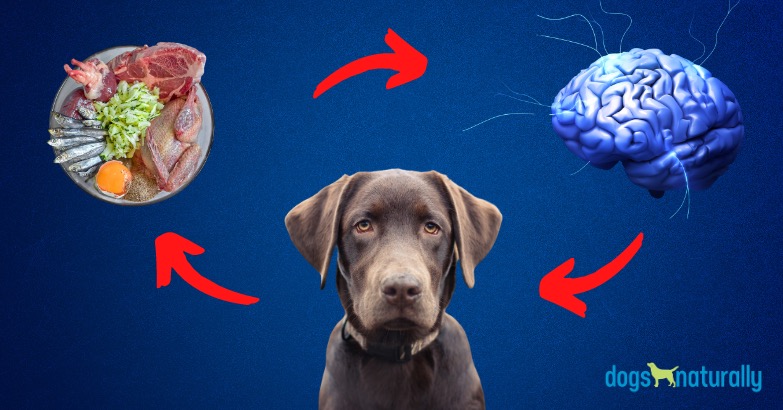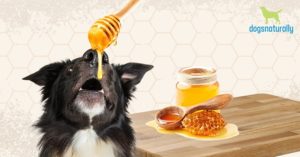Food doesn’t just affect your dog’s health; you can improve behavior with the right diet. Think of it as brain food for dogs …
We humans are tricky creatures to please. We ask a lot of our dogs. We expect them to entertain themselves while they’re alone. To understand and follow our commands, and be friends with every dog they meet.
Because we have such high demands, it makes sense for us to do all we can to provide our furry friends with the best tools to achieve peak good dog. Along with adequate enrichment, socialization, exercise and training … we’re starting to learn what dietary factors may support good brain health and behavior.
When we discuss behavior in dogs, there are a few specific aspects that we’re interested in:
- Ability to cope with stressful events and situations
- Ability to learn and reproduce skills on command
- Ability to control aggressive tendencies
Research into the effects of diet on brain health and behavior is in its infancy. But we already have a lot of information to work with. Here are some of the elements that make up the ideal diet to support your dog’s brain health.
Protein
Dietary proteins are key building blocks of body tissues. The body uses them as fuel when other sources are lacking. Some proteins are even important ingredients in chemical messengers called neurotransmitters.
Specific neurotransmitters are important in cognition, reward, memory, and in moderating anxiety. Serotonin and noradrenaline are two of these important neurotransmitters.
Low serotonin levels in several species (including dogs) correlate with:
- Insomnia
- Aggression
- Depression
- Mood swings
- Mania
- Anxiety
- Obesity
- Increased pain sensitivity
- Obsessive-compulsive behaviors
Hyperactivity, territorial and dominance aggression may be lower in dogs on high protein diets with tryptophan supplementation. The body uses tryptophan to make serotonin. Pigs and rats on a tryptophan-supplemented diet had better resilience to stress. They also had less anxiety.
There’s some suggestion that a low protein diet may help reduce fear-associated aggression (although not other behavioral problems) … because it increases the ratio of tryptophan to other proteins.
Noradrenalin is lower in animals after periods of prolonged stress. The body produces noradrenalin, a neurotransmitter and stress hormone. It acts on the fear response part of the brain. Tyrosine supplementation can reduce stress-associated behavioral problems and depression in animals. The body uses tyrosine to make noradrenalin.
Evidence on specific amino acid supplementation and dog behavior is fairly inconclusive. But certain proteins are very important in ensuring adequate levels of important neurotransmitters.
I recommend you ensure your dog eats a diet rich in high-quality proteins … especially during times of stress. This will help support your dog’s brain health and behavior.
RELATED: How to make sure your dog gets enough protein …
Fat
Fat is a very broad term and can be a very confusing aspect of nutrition.
- Some fats are essential for health
- Other fats are very detrimental to health
- Some are necessary in moderation … but harmful in excess
- Some come directly from the fats your dog eats
- Others form in the body when it receives excess calories from carbohydrates
Diets high in bad fats (like refined oils) lead to increased sensitivity to stressors in rats. They also have led to decreased memory.
Good fats, like omega-3s, may help.
High levels of omega-3s may help recovery psychiatric injury after following a brain injury. Low levels may lead to increased stress, anxiety, and aggression in dogs.
Omega-3 supplementation in humans can decrease depression and anxiety symptoms. It may help with improved memory. It can help stave off cognitive decline. Infants given omega-3 supplements had better vision and cognitive function than those without.
Dogs appear more aggressive with low dietary intake of cholesterol. This might reduce serotonin production. Serotonin is a mood-stabilizing hormone.
To help your dog maintain peak brain health, a diet rich in omega-3s with enough cholesterol is key. Consider adding eggs, and occasional oily fish (sustainably sourced) to your dog’s diet.
RELATED: The healthiest fats for dogs …
Fiber
Aside from helping to feed your dog’s gut bacteria, fiber is essential for several reasons.
It helps the body …
- Get rid of waste
- Boost gastrointestinal tract health
- Maintain a feeling of fullness (satiety) after meals
Studies have found:
A high fiber diet (HFD) decreased activity … and improved calmness levels in kenneled beagles. This could be due to satiety.
HFD reduces stereotypic behaviors and aggression in pigs. Piglets born to sows fed an HFD were less aggressive to one another before weaning.
Providing your best friend with adequate fiber can lower hunger-related stress … resulting in a calmer, less anxious dog.
Consider increasing the high fiber vegetables in your dog’s diet to promote brain health. Or adding a supplement like psyllium husk. (Make sure your dog gets plenty of water if you use psyllium husk so she doesn’t get constipated.)
RELATED: The best sources of fiber for dogs …
Carbohydrates
Carbohydrates are present in grains and vegetables. They are the brain’s preferred source of energy. Complex carbohydrates can be an excellent slow-release source of energy for our dogs.
However, numerous studies have found that eating refined sugars and carbohydrates is harmful to the brain. It impairs memory and worsens mood disorders. This is just one reason to avoid commercial pet diets high in refined carbohydrates.
RELATED: Reasons to avoid carbohydrates in dog food …
Probiotics
Probiotics provide a source of beneficial gut bacteria that support gut health.
Researchers are drawing links between probiotic supplementation and brain health … including behavioral benefits. Making sure your dog has a healthy gut microbiome is important for a myriad of reasons. But there are some specific behavioral effects …
The gut microbiome is different in aggressive vs non-aggressive dogs.
Probiotic supplementation (specifically Lactobacillus and Bacteroides) in dogs, compared to placebo, can …
- reduce anxious behaviors
- decrease heart rate
- lower salivary cortisol
Evidence shows that healthy gut bacteria can help normal neural development. A good gut can also help with brain biochemistry and behavior. The gut microbiome produces tryptophan, which the body uses to make serotonin.
Bacterial populations that are elevated in dogs with inflammatory bowel disease are also high in more aggressive dogs.
Broad-spectrum probiotics can help dogs with Alzheimer’s-like disease. ALD dogs have shown cognitive function improvements with these probiotics. Quail fed with probiotics performed better in memory tests.
There’s overwhelming evidence that a diverse microbiome and probiotic supplementation are beneficial in:
- Reducing stress
- Improving memory
- Decreasing aggression
- Slowing age-related cognitive decline in dogs
Help improve the health of your dog’s gut bacteria by feeding a whole balanced diet. Give plenty of fiber and supplementary probiotics.
RELATED: Read more about probiotics for dogs …
Vitamins And Antioxidants
A nutrient-rich diet for dogs enables peak body and brain performance.
Certain vitamins such as thiamine are essential for maintaining healthy brain cells. Antioxidants in many vegetables and whole foods can help prevent brain cell damage … caused by normal metabolism.
Dogs naturally develop ALD and cognitive dysfunction as they age. Researchers have chosen dogs to test many antioxidants and vitamins. And these are now recommended for humans. So far we know that:
- An antioxidant rich diet improves and maintains cognition and reduces ALD in dogs.
- Curcumin (a compound in turmeric) in aged dogs helps prevent ALD.
- Green tea extract may decrease age related cognitive decline. I recommend using it with caution at no more than 200mg per 2 lbs body weight per day. Give after food to avoid gastrointestinal or liver problems.
- Resveratrol, an antioxidant in grapes and nuts, helps prevent problems associated with chronic stress
Caution: grapes are toxic to dogs. Feed berries like cranberries, blueberries or mulberries for a dog-friendly source of resveratrol. If giving nuts, avoid walnuts and macadamias for dogs.
Thiamine has been found to reverse aggression in adolescent humans who are thiamine deficient.
When you feed a home prepared diet, make sure it contains plenty of sources of antioxidants. Consider including a wide variety of colorful vegetables in your dog’s diet … and adding fresh turmeric root or a turmeric supplement. Vegetables should be puréed for digestibility.
Calorie Restriction
Calorie restriction means reducing food intake without causing malnutrition. It’s been linked to a whole host of long-term health benefits … and potentially positive effects on cognition and behavior.
Long-term, mild calorie restriction may increase “healthspan” and lifespan. It can delay onset of age related decline. It can decrease aggression, anxiety, and fear. It can also help improve memory and learning in animals.
High calorie intake may increase the risk of mild cognitive impairment.
So, a long term calorie restricted diet may benefit your dog’s brain health and behavior. Work with your holistic vet to maintain a healthy weight and nutrition plan.
At first, your dog may display more food aggression, begging or scavenging … because she’s hungrier! You can manage this with extra non-starchy veggies or fiber supplements to help your dog feel full.
Consider increasing fiber and feeding at least every 12 hours. Prolong feeding time with enrichment to help avoid behavioral problems during the transition. Puzzle feeders can help with any initial behavioral problems.
Your Dog’s Diet Makes A Difference
To summarize … research strongly suggests that diet impacts dogs’ brain health, cognitive abilities, and behavior.
While I’m not suggesting that dietary changes alone are a replacement for enrichment, socialization, exercise, and training … there are many take-home messages that just might help your furry friend be the best good dog she can be:
- Feed ample good quality proteins.
- Add omega-3 supplements or oily fish to your dog’s diet.
- Provide adequate dietary fiber. This can be in the form of vegetables or supplements like psyllium husk.
- Avoid refined carbohydrates.
- Give broad spectrum probiotics.
- Ensure adequate vitamin and mineral balance of home-made diets.
- Provide plenty of antioxidants in the form of vegetables and a turmeric supplement.
- Consider a calorie restricted diet, while ensuring adequate nutrition and satiety.













